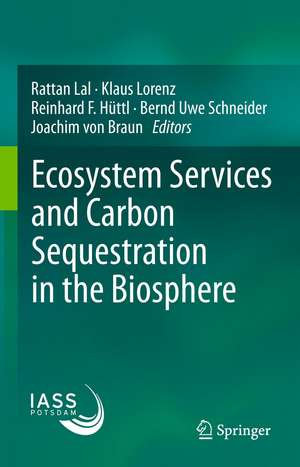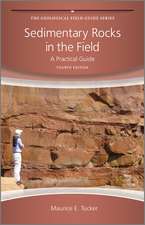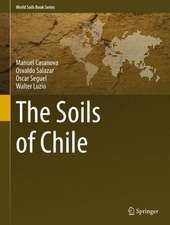Ecosystem Services and Carbon Sequestration in the Biosphere
Editat de Rattan Lal, Klaus Lorenz, Reinhard F. Hüttl, Bernd Uwe Schneider, Joachim von Braunen Limba Engleză Paperback – 23 iun 2015
| Toate formatele și edițiile | Preț | Express |
|---|---|---|
| Paperback (1) | 1051.00 lei 38-44 zile | |
| SPRINGER NETHERLANDS – 23 iun 2015 | 1051.00 lei 38-44 zile | |
| Hardback (1) | 1061.41 lei 38-44 zile | |
| SPRINGER NETHERLANDS – 11 iun 2013 | 1061.41 lei 38-44 zile |
Preț: 1051.00 lei
Preț vechi: 1382.89 lei
-24% Nou
Puncte Express: 1577
Preț estimativ în valută:
201.13€ • 218.40$ • 168.95£
201.13€ • 218.40$ • 168.95£
Carte tipărită la comandă
Livrare economică 18-24 aprilie
Preluare comenzi: 021 569.72.76
Specificații
ISBN-13: 9789401783026
ISBN-10: 9401783020
Pagini: 476
Ilustrații: X, 464 p.
Dimensiuni: 155 x 235 x 25 mm
Greutate: 0.66 kg
Ediția:2013
Editura: SPRINGER NETHERLANDS
Colecția Springer
Locul publicării:Dordrecht, Netherlands
ISBN-10: 9401783020
Pagini: 476
Ilustrații: X, 464 p.
Dimensiuni: 155 x 235 x 25 mm
Greutate: 0.66 kg
Ediția:2013
Editura: SPRINGER NETHERLANDS
Colecția Springer
Locul publicării:Dordrecht, Netherlands
Public țintă
GraduateCuprins
Foreword.- 1 Societal Dependence on Soil’s Ecosystem Services.- 2 Soils and Ecosystem Services.- 3 Ecosystem Carbon Sequestration.- 4 Food Security Through Better Soil Carbon Management.- 5 Soil Carbon and Water Security.- 6 Forests, Carbon Pool and Timber Production.- 7 Ecosystem Carbon and Soil Biodiversity.- 8 Ecosystem Services and the Global Carbon Cycle.- 9 Losses of Soil Carbon to the Atmosphere via Inland Surface Waters.- 10 Why Pests and Disease Regulation Should Concern Mankind.- 11 Natural Hazards Mitigation Services of Carbon-Rich Ecosystems.- 12 Safeguarding Regulating and Cultural Ecosystem Services: Degradation and Conservation Status.- 13 Human Appropriation of Net Primary Production, Stocks and Flows of Carbon, and Biodiversity.- 14 Soil Carbon and Biofuels.- 15 Land Degradation and Ecosystem Services.- 16 The Human Dimensions of Environmental Degradation and Ecosystem Services: Understanding and Solving the Commons Dilemma.- 17 Soil Organic Carbon, Soil Formation and Soil Fertility.- 18 Managing Soil Organic Carbon for Advancing Food Security and Strengthening Ecosystem Services in China.
Recenzii
From the reviews:
“This 19-chapter volume … presents the issues, facts, societal challenges, and potential solutions in stimulating the strengths of carbon sequestration in different ecosystems worldwide. … Valuable for students, researchers in global change science, policy makers, and carbon management practitioners. Summing Up: Highly recommended. Upper-division undergraduates and above.” (J. Chen, Choice, Vol. 51 (7), March, 2014)
“This 19-chapter volume … presents the issues, facts, societal challenges, and potential solutions in stimulating the strengths of carbon sequestration in different ecosystems worldwide. … Valuable for students, researchers in global change science, policy makers, and carbon management practitioners. Summing Up: Highly recommended. Upper-division undergraduates and above.” (J. Chen, Choice, Vol. 51 (7), March, 2014)
Textul de pe ultima copertă
This book describes comprehensively potential, co-benefits and drawbacks of carbon (C) sequestration for ecosystem services. Soil generates numerous ecosystem services for human wellbeing and ecological functions. The services discussed include provisional (feed, food, timber, biofuel), regulating (carbon sequestration, pests, diseases), cultural, and supporting (soil formation, nutrient cycling) services. Recarbonization of the biosphere is a potential strategy to redistribute C among global pools, and to enhance ocean but most importantly land-based C sinks with possible feedback on soil-based ecosystem services. Land use and soil management can degrade soil quality, and either reduce quantity and quality of ecosystem services or lead to disservices and create large ecological footprint. Thus, trade-offs between carbon sequestration and ecosystem services must be considered when incentivizing land managers through payments for ecosystem services. Together with sustainable management of land-based C sinks for climate change adaptation and mitigation this will minimize the risks of recarbonization of the biosphere for ecological functions and human wellbeing.
Caracteristici
Renowned experts deliberate on the possible effects of recarbonization of the biosphere on ecosystem services and human wellbeing The comparison of ecosystem services and their interaction with carbon sequestration in the biosphere helps the reader in identifying challenges and opportunities to incentivize payments for ecosystem services Includes interdisciplinary and transdisciplinary approaches for minimizing risks for ecosystem services by a recarbonized biosphere







